BEE KEEPING COURSES
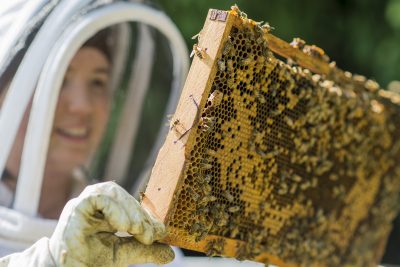
Every year I put together several bee keeping courses and advertise these on the website (Course Calendar) and my Facebook page. The courses are always tailored to meet the individual’s needs and cover all the relevant theoretical and practical knowledge required to give you the confidence to operate and handle the bees on your own, whilst learning in a friendly and stress free environment. My bee keeping courses run from our Novice package through to Queen Rearing and are graded in 4 stages as set out below. My courses are limited to a maximum of 4 people; this ensures you get my undivided attention during your course and have the benefit of a full hands on experience. Joining instructions, a full course programme and self study notes are provided well in advance of the course.
I am still be able to offer 3 of these packages as online beekeeping courses, completed over zoom and covering the theoretical aspects of each respective bee keeping course.
COURSE CONTENT
Novice – An Introduction to Beekeeping
Course includes:
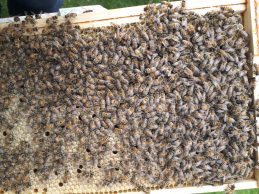 Theory which includes the bee’s anatomy, the colony make up and structure, the hive and hive preparation, the growth of the colony, basic hive inspection and record keeping. There will be a small amount of pre-learning (home study) before attending the Novice (basic) bee keeping course. This will be provided in a small booklet sent prior to the start of the course.
Theory which includes the bee’s anatomy, the colony make up and structure, the hive and hive preparation, the growth of the colony, basic hive inspection and record keeping. There will be a small amount of pre-learning (home study) before attending the Novice (basic) bee keeping course. This will be provided in a small booklet sent prior to the start of the course.- Practical hands on beekeeping where you will be guided through handling bees, looking for problems and how to recognise brood, workers, drones, finding the queen and lots more (weather permitting).
Intermediate – Making splits and Swarm Control
Course includes:
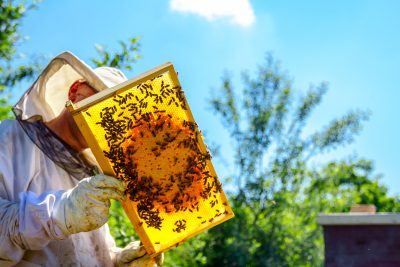
- Theory which includes making a simple colony split to a nucleus. Types of Nucleus and Nucleus preparation. Making a split using a queen cell. Making multiple splits using laying/virgin queens to a nucleus. There will be a small amount of pre learning (home study) before attending the intermediate bee keeping course. This will be provided in a small booklet sent prior to the start of the course.
- Practical hands on beekeeping where you will be shown how to handle bees, set up both 3 frame and 5 frame nucleus, understand how to manipulate the colony to prevent the bees swarming, their control and looking for problems associated with swarming and queen cells (weather permitting).
Advanced – Feeding, Treatments, Recognising Disease and Overwintering Colonies
Course includes:
- Theory to making sugar syrup mix, pollen substitute and the methods of feeding. Appropriate quantities
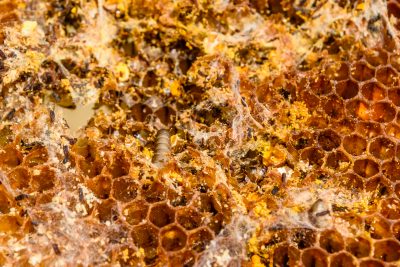 of stores (food) for each hive structure and weight to overwinter the colony. Emergency feeding if it goes wrong. Recognising diseases, viruses and pest of bees, including Chalk Brood, European Foul Brood (EFB) American Foul Brood (AFB) and how to report these. Treatments for hive beetle, varroa mites, nosema and acarine. There will be a small amount of pre-learning (home study) before attending the advanced bee keeping course. This will be provided in a small booklet sent prior to the start of the course.
of stores (food) for each hive structure and weight to overwinter the colony. Emergency feeding if it goes wrong. Recognising diseases, viruses and pest of bees, including Chalk Brood, European Foul Brood (EFB) American Foul Brood (AFB) and how to report these. Treatments for hive beetle, varroa mites, nosema and acarine. There will be a small amount of pre-learning (home study) before attending the advanced bee keeping course. This will be provided in a small booklet sent prior to the start of the course. - Practical hands on beekeeping where you will inspect the colony for its health and disease and treat the hive for varroa mites and small hive beetle (weather permitting).
Queen Rearing and Introduction. Techniques, Cell builder, Finisher Mini Mating Nuc
Course includes:
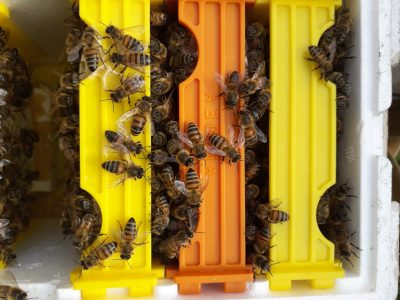
- Theory Understanding the theory behind raising queens and producing your own queen cells. Simple queen replacement and supersedure, the Mini Mating Nuc, understanding grafting, establishing a cell builder and finishing colony. Use of mini mating nucleus for queen rearing and mating. The introduction of new or replacement queens to a colony.
- Practical hands on beekeeping where you will establish a mini mating nucleus or Nuc hive from another colony, introduce a queen or queen cell to a colony and establish a mini mating nucleus for raising and mating queens (weather permitting).
All of my bee keeping courses are conducted within the Chatteris / Somersham area of Cambridgeshire, with easy access routes from the A1 and A14. Full joining instructions for the course, routes to find us and the location of the training will be sent prior the the course starting once payment has been received. For information on course availability and to book please look at the Course Calendar. I look forward to hearing from you and seeing you on one of the courses in the future.